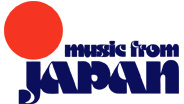
The Works of Maki Ishii / Teruhisa Fukuda Shakuhachi Concert
Music From Japan was proud to present the acclaimed shakuhachi master, Teruhisa Fukuda, in his American debut during its 1999 Festival in February. Mr. Fukuda attracted large and enthusiastic audiences in Los Angeles, Washington DC, Toronto, and New York City. The highlight of the New York Festival was a concert featuring the music by one of Japan’s leading composers, Maki Ishii. The Festival continued with a symposium, “Recent Changes in Japanese Music,” and a shakuhachi master class at Columbia University. The Music From Japan 1999 Festival was presented in association with the Japan Federation of Composers.
Los Angeles
The U.S. debut of the shakuhachi virtuoso Teruhisa Fukuda captivated the largest audience ever to fill the Japan Foundation Language Center Hall in Los Angeles. The opening concert of the Music From Japan Festival held on February 18th included traditional shakuhachi honkyoku and two American premieres: Shiki-soku-zeku III by Choji Kaneta and Fish on Horizon by Atsuki Sumi. Mr. Fukuda was joined by Ms. Shihou Kineya on shamisen in two pieces. A post-performance discussion was conducted with questions posed by the audience. This concert was made possible in part by the efforts of Mr. Isao Tsujimoto, Director of The Japan Foundation L.A., who also introduced Mr. Fukuda in his American premiere.
Washington, D.C.
For the second consecutive season, the Music From Japan Festival was privileged to be presented by the Smithsonian Institution at the Freer Gallery of Art. On February 20th, Teruhisa Fukuda fascinated the audience in our Capital. According to Ron Broun of The Washington Post, “Fukuda demonstrated conclusively that the shakuhachi and the enlightened Zen tradition associated with it can be compellingly expressive and satisfying to a Western audience.” Makato Moroi’s Chikurai Go-Sho was also well received.
Toronto
Teruhisa Fukuda continued his North American tour with the Music From Japan 1999 Festival in Toronto where he made his Canadian debut. At the Music Gallery on February 23rd, the program was repeated to the rave reviews of The New Canadian. The performance by Mr. Fukuda is said to have “taken [the audience] to the realm of fantasy.”
New York
The first of two concerts at Merkin Concert Hall at Abraham Goodman House was an evening dedicated to the chamber works of the internationally renowned contemporary composer Maki Ishii. KI-SHO-TEN-GO, a Music From Japan commission, was conducted by the composer himself for its world premiere on February 27th. The New York Times critic Anthony Tommasini commented on the “criss-crossing sounds of East and West” in Mr. Ishii’s work. A resident of both Tokyo and Berlin, he acknowledges the synthesis between the traditions of his native country as well as Western music in his pieces. In KI-SHO-TEN-GO Teruhisa Fukuda represents the East through his shakuhachi. Tomassini goes on to describe Ishii’s compositions as elegantly [combining] layers of musical materials,” and “fascinating.” The marimba duo, Hiten-Seido II also attracted attention as it is seldom performed in the U.S. due to the rarity of the required instruments themselves and the technical abilities of two virtuoso percussionists. The piece was flawlessly executed by remarkable marimbists William Moersch and Nachiko Maekane. Other notable appearances included solos by Eriko Sato, violin, Fred Sherry, cello, and Pete Rose, recorder. Mr. Ishii delivered a pre-concert lecture touching on themes from his book, Sounds of East-Sounds of West: Maki Ishii’s Music, Striding Two Musical Worlds.
The Second concert in New York on February 28th was the final performance of Teruhisa Fekuda’s North American tour. It was followed by the annual symposium “Recent Changes in Japanese Music” with keynote speaker Dr. Akihiro Komori. The season was brought to a close with a master class held at Columbia University by Mr. Fukuda on March 1st.
Central Asian Tour
In September, the Japan Foundation presented Music From Japan in its first tour to Central Asia with Masters of Tradition: Junko Handa, biwa; Reiko Kimura, koto; Kazuko Takada, sangen; Kohei Nishikawa, yokobue; and Seizan Sakata, shakuhachi. Traditional pieces, contemporary works by Minoru Miki and Junko Handa, and Ode to the Fountain of Togyoku by Katsutoshi Nagasawa, a 1995 Music From Japan commission for the South American tour, were performed in Almaty, Kazakhstan on September 21, 1999 and in Tashkent, Uzbekistan, on September 24. A lecture on Japanese music and the program preceded the concerts.
© Music From Japan, Inc.
